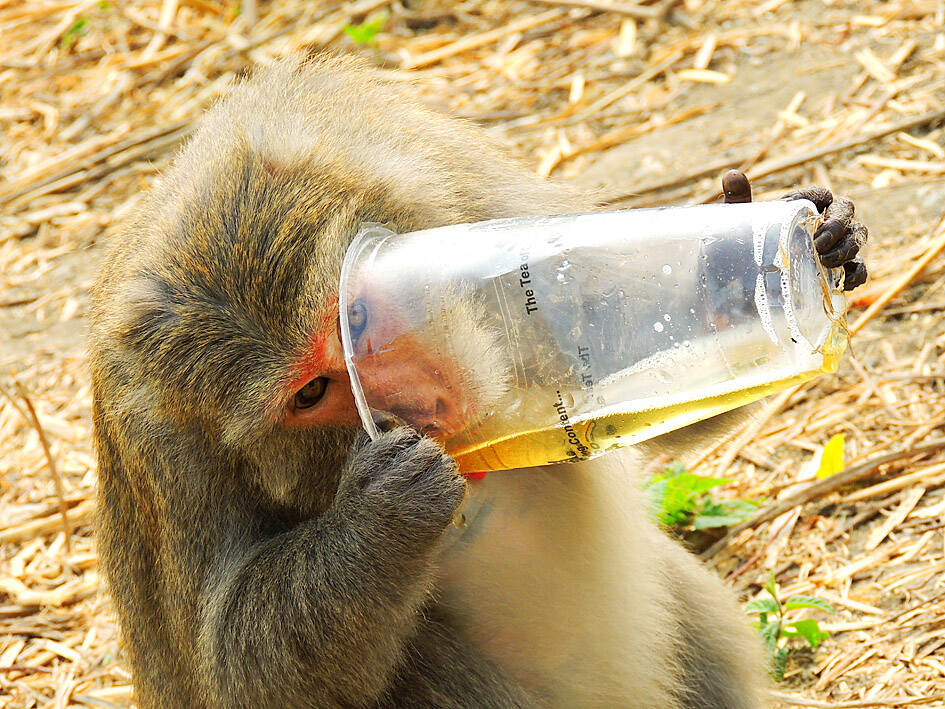Increased contact between humans and Formosan macaques in the Shoushan (壽山) area of Kaohsiung’s Gushan District (鼓山) might be increasing the risk of life-threatening diseases jumping species, a National Pingtung University of Science and Technology report said.
The report was commissioned by the Ministry of the Interior’s National Nature Park Headquarters for its Project to Monitor Taiwan Macaque Populations and Research Macaque-related Disease and Health.
Incidents of macaques jumping on people are likely prompted by increased contact, as the monkeys have learned that interacting with people is one way to obtain food, said Su Hsiu-hui (蘇秀慧), an associate professor at the university’s Institute of Wildlife Conservation.

Photo courtesy of the National Nature Park
However, such interactions could cause diseases to be transmitted both ways, or lead to conflict between people and macaques, Su said.
Humans and macaques share a common susceptibility to many kinds of diseases, including Cercopithecine herpesvirus (CHV-1), dengue fever and amebiasis, said Chen Chen-chih (陳貞志), a professor at the institute who heads the project.
The infection rate among adult macaques for CHV-1 is about 100 percent, Chen said, adding that human-macaque contact increases the risk of people being exposed to a deadly virus.
The macaque population in the Shoushan area has been under high pressure, possibly due to increased population size and increasing contact with people, he said.
Incidents of conflict between people and macaques have been rising, the park headquarters said, citing an incident last year in which a visitor to the area was bitten by a macaque that jumped onto their back.
Faced with such a situation, people should keep calm and move slowly toward a tree so that the monkey would be inclined to jump either onto the tree or the ground, the park said.
People should refrain from waving their hands or other actions that the animals might perceive as aggressive, it said.
Shoushan is a natural habitat of Taiwanese macaques and people should avoid contact with them, including by feeding or provoke them, it said.
People who contravene rules against contact with wildlife face a fine of NT$3,000 as stipulated by the National Park Act (國家公園法), and NT$5,000 to NT$10,000 under the Kaohsiung City Autonomous Act on Wildlife Conservation (高雄市野生動物保育自治條例), it added.

‘DENIAL DEFENSE’: The US would increase its military presence with uncrewed ships, and submarines, while boosting defense in the Indo-Pacific, a Pete Hegseth memo said The US is reorienting its military strategy to focus primarily on deterring a potential Chinese invasion of Taiwan, a memo signed by US Secretary of Defense Pete Hegseth showed. The memo also called on Taiwan to increase its defense spending. The document, known as the “Interim National Defense Strategic Guidance,” was distributed this month and detailed the national defense plans of US President Donald Trump’s administration, an article in the Washington Post said on Saturday. It outlines how the US can prepare for a potential war with China and defend itself from threats in the “near abroad,” including Greenland and the Panama

The High Prosecutors’ Office yesterday withdrew an appeal against the acquittal of a former bank manager 22 years after his death, marking Taiwan’s first instance of prosecutors rendering posthumous justice to a wrongfully convicted defendant. Chu Ching-en (諸慶恩) — formerly a manager at the Taipei branch of BNP Paribas — was in 1999 accused by Weng Mao-chung (翁茂鍾), then-president of Chia Her Industrial Co, of forging a request for a fixed deposit of US$10 million by I-Hwa Industrial Co, a subsidiary of Chia Her, which was used as collateral. Chu was ruled not guilty in the first trial, but was found guilty

A wild live dugong was found in Taiwan for the first time in 88 years, after it was accidentally caught by a fisher’s net on Tuesday in Yilan County’s Fenniaolin (粉鳥林). This is the first sighting of the species in Taiwan since 1937, having already been considered “extinct” in the country and considered as “vulnerable” by the International Union for Conservation of Nature. A fisher surnamed Chen (陳) went to Fenniaolin to collect the fish in his netting, but instead caught a 3m long, 500kg dugong. The fisher released the animal back into the wild, not realizing it was an endangered species at

DEADLOCK: As the commission is unable to forum a quorum to review license renewal applications, the channel operators are not at fault and can air past their license date The National Communications Commission (NCC) yesterday said that the Public Television Service (PTS) and 36 other television and radio broadcasters could continue airing, despite the commission’s inability to meet a quorum to review their license renewal applications. The licenses of PTS and the other channels are set to expire between this month and June. The National Communications Commission Organization Act (國家通訊傳播委員會組織法) stipulates that the commission must meet the mandated quorum of four to hold a valid meeting. The seven-member commission currently has only three commissioners. “We have informed the channel operators of the progress we have made in reviewing their license renewal applications, and